October in Berlin: Two experiences that centred around the importance of storytelling.
The Israeli writer Etgar Keret’s new exhibition Inside Out at the Jewish Museum Berlin features the following quotation: “It’s much harder for people to deny your humanity when you speak their language.”
I would modify that slightly to say: It’s much harder for people to deny your humanity when they hear your stories.
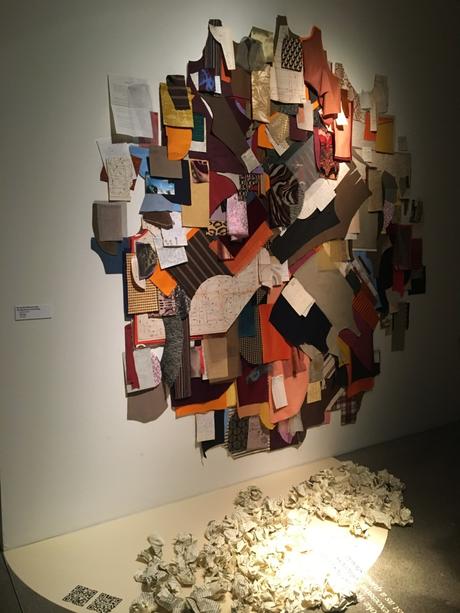 Inside Out Etgar Keret at The Jewish Museum Berlin
Inside Out Etgar Keret at The Jewish Museum Berlin
In Jewish culture, an ancient tradition stems from the Exodus verse, “And you shall tell your children.” Every Jewish person is obliged to relay their family histories to their children. For displaced people, this process is an essential part of preserving your identity and knowing yourself.
But telling stories when you have a history of trauma and displacement is a tricky task. Just ask Keret, who tried to tell the story of his mother — a woman who survived World War Two — in this exhibition. The floor is scattered with crumpled bits of paper. Bend down and take one (you’re allowed!), and you can read one of nine short stories he wrote about her and her life. There’s also a gum ball machine containing “half-baked stories” about her. It dispenses coloured capsules that contain a fragment of a story that didn’t quite make the cut.
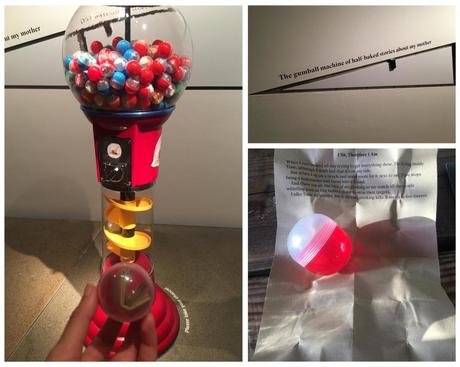 Inside Out Etgar Keret at The Jewish Museum Berlin
Inside Out Etgar Keret at The Jewish Museum Berlin
The exhibition is an interactive mishmash of paper art, video, textile, and more. For Keret, who has written many books, short stories and screenplays, this was the only way to tell his mother’s story.
“All she had was a giant mosaic composed of countless shards of memories and experience-fragments. A history devoid of dates and names, a chronicle of sensations and fears and smells: her own private history.”
Etgar Keret
A similar methodology defines the work of The Freedom Theatre, a cultural center and community-based theater based in Jenin Refugee Camp, occupied Palestine. In October, artistic director Ahmed Tobasi ran a drama workshop at Theatrehaus Mitte Berlin.
For Tobasi, storytelling is also an important part of his survival, and the survival of his people.
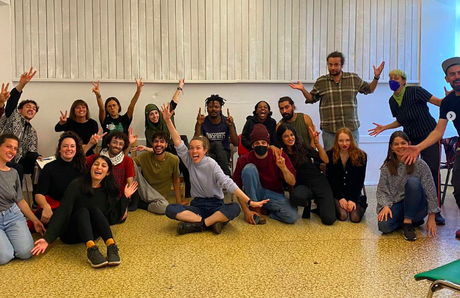 Ahmed Tobasi The Freedom Theatre, Theaterhaus Mitte Berlin
Ahmed Tobasi The Freedom Theatre, Theaterhaus Mitte Berlin
Like most of the people he works with, Tobasi was born in Jenin refugee camp. The camp occupies less than half a square kilometre, and currently holds a population of about 14,000 people. That’s a population density of about 33,333 per sq km. To put that into perspective, in Berlin that number is 4,048. Many children live here, even though the camp has no facilities like playgrounds. In addition, the camp is subject to extreme violence and clashes that kill refugees and have emotional, physical and psychosocial affects. So how does the theater engage the people living in these circumstances to tell their stories?
We started slowly, with a standard theater exercise: One person says sits on a chair in the middle of a circle and says one thing that’s true about themselves. For example, “I like chicken.” If that statement is true for anyone else in the room, they have to get up and switch chairs — a process that always lands someone else in the middle of the circle having to share a new statement. Slowly, Tobasi pushed everyone to share deeper and deeper truths, getting us to open up and connect to each other.
He then pushed this personal truth-telling further with a physical exercise that involved prompts like, When did you first cross a border? What is your first memory of a smell? Think of a time when you felt like your freedom was restricted… a time when you felt danger.
The stories that emerged were raw, sensory and fragmentary. A man recalled crossing the border from East to West Germany as a child. A refugee from Jenin’s first smell memory was of burning tyres. Another remembered the feeling of being powerless and unable to move at the age of eight, when he encountered an Israeli tank coming towards him on his way home from school. A Russian woman remembered fleeing through the Siberian forest with her mother, being chased by her father with a shotgun.
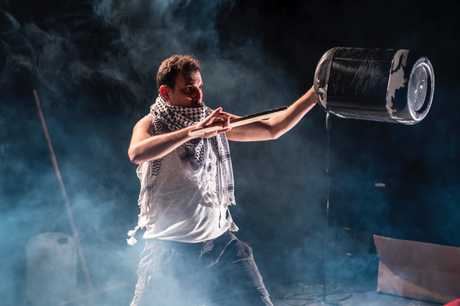 Ahmed Tobasi, actor and director of The Freedom Theatre
Ahmed Tobasi, actor and director of The Freedom Theatre
Stories connect people. It doesn’t matter where we come from, or what our specific experiences are. In stories, we recognize our shared humanity. Although Tobasi gave equal space to everyones’s feelings and stories, emphasising that no struggle or story was more important than another, some differences emerged. When we were asked to picture our futures, for example, the Palestinian refugees living in Berlin expressed vague and unsure feelings. Their reality is deeply unsettled, as they are caught in a war that has been waging for decades with little hope for the future.
Yet, for Tobasi, theater is part of that war. For him, freedom is not only something that must be won from the outside; it’s something that must be developed from within. From inside out, as it were.
Not only do theater and stories help you know yourself, and free your mind; they can also impact wars. It’s no accident that The Freedom Theatre’s co-founder and artistic director Juliano Mer Khamis was assassinated by a masked gunman right in front of the theater. He was just 52 years old, and had his baby son with him.
“The third intifada will be a cultural one.”
Juliano Mer Khamis
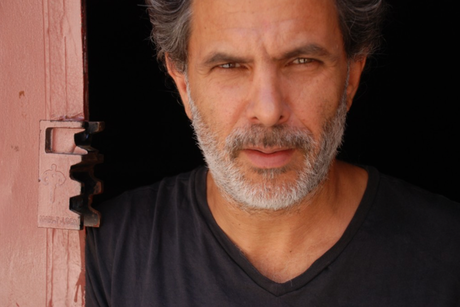 Juliano Mer Khamis, co-founder of The Freedom Theater
Juliano Mer Khamis, co-founder of The Freedom Theater
Tobasi told his own story using the same prompts he had given us. Painting a fragmentary picture of growing up in Jenin refugee camp, joining the armed resistance, spending four years in an Isreali prison before deciding pursue into theatre…The result was a series of short, sensory stories that created a strong impression of him and his life — much like the nine short stories of Keret’s exhibition.
Other parallels emerged. When we moved on to improvise short scenes illustrating current issues and injustices in Berlin, many refugees focussed on the horrors of bureaucracy. How it can intimidate, humiliate, and frustrate you. How it can shatter your sense of self. Keret’s exhibition features a huge birth certificate made of metal. It hangs darkly from the ceiling, accompanied by ominous sounds. At random intervals, it starts to shudder and shake. The art work accompanies a story about the time when Keret took his mother to Warsaw for her 80th birthday. It was her first trip back to her childhood home since the war. While they were there, they visited the local archives to see his mother’s papers and discovered that the day she had always celebrated as her birthday was in fact, not her real birthday. The revelation shook her.
This multi-faceted, unconventional way of telling stories is also a form of resistance. As a writer, I’ve been thinking a lot recently about our responsibility as storytellers. Storytelling is integral how we understand ourselves, and the world around us — and our responsibility as creators to encompass the contradictory, complex nature of reality within the stories we tell.
I think one of the reasons for the rise in societal polarisation and conspiracy theories is down to the stories we tell. People are used to seeing simple narratives with graspable characters, good guys and bad guys, in situations where everything gets resolved and neatly wrapped up with a bow at the end. And that’s how people expect the world to work.
To be fair, politics has had a hand in using storytelling to simplify reality too. I recently watched Adam Curtis’s Hypernormalisation, which paints a compelling narrative of how we got to where we are now.
What Tobasi understands, and what Keret understands, is that culture — theatre, art, stories — is a crucial form of resistance in society and politics. Let’s participate in more of it!
Inside Out is on at the Jewish Museum Berlin until 5 February 2023. Donate to The Freedom Theatre and check out their vital work.
